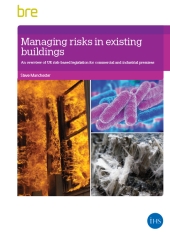Managing risks in existing buildings: An overview of UK risk-based legislation for commercial and industrial premises (FB 86)
BRE (Building Research Establishment) is an independent, research-based consultancy, testing and training organisation, operating in the built environment and associated industries.
On 30 November 2016, BRE published Managing risks in existing buildings: An overview of UK risk-based legislation for commercial and industrial premises (FB 86) by Steve Manchester.
The three main drivers for managing risks in a building or on a site are:
This guide provides an overview of issues to consider, techniques and information sources to improve the management of risks in buildings by the building owner, manager or user. This should result in reduced business losses, lower insurance premiums, improvements in operating costs, reduced absences and a reduction in reactive mitigation measures necessary after an incident.
It applies to all existing, non-domestic buildings in the UK, including; offices, warehouses, industrial/processing sites, transport hubs such as airports and railway stations, and so on. It covers risks that can have a major impact buildings, site infrastructure and occupants, such as:
- Fire.
- Explosion.
- Asbestos.
- Legionella.
- Radon.
- Noise.
- Vibration.
- Flooding.
- Contaminated land.
- Environment.
The wide-ranging nature and use of buildings means there may be some types of risk that are not covered, although the general principles for risk assessment will still apply. Risks to occupants from personal accidents such as trips, falls, manual handling and repetitive strain injuries are not covered, neither are risks from electrical or mechanical equipment in so far as they affect an individual person.
The contents of the guide include:
- Executive summary.
- Introduction.
- Hazard and risk.
- Current legislative framework.
- Analysis of specific hazards.
- Holistic benefits.
- References.
[edit] Related articles on Designing Buildings Wiki
Featured articles and news
The UK's Modern Industrial Strategy: A 10 year plan
Previous consultation criticism, current key elements and general support with some persisting reservations.
Building Safety Regulator reforms
New roles, new staff and a new fast track service pave the way for a single construction regulator.
Architectural Technologist CPDs and Communications
CIAT CPD… and how you can do it!
Cooling centres and cool spaces
Managing extreme heat in cities by directing the public to places for heat stress relief and water sources.
Winter gardens: A brief history and warm variations
Extending the season with glass in different forms and terms.
Restoring Great Yarmouth's Winter Gardens
Transforming one of the least sustainable constructions imaginable.
Construction Skills Mission Board launch sector drive
Newly formed government and industry collaboration set strategy for recruiting an additional 100,000 construction workers a year.
New Architects Code comes into effect in September 2025
ARB Architects Code of Conduct and Practice available with ongoing consultation regarding guidance.
Welsh Skills Body (Medr) launches ambitious plan
The new skills body brings together funding and regulation of tertiary education and research for the devolved nation.
Paul Gandy FCIOB announced as next CIOB President
Former Tilbury Douglas CEO takes helm.
UK Infrastructure: A 10 Year Strategy. In brief with reactions
With the National Infrastructure and Service Transformation Authority (NISTA).
Ebenezer Howard: inventor of the garden city. Book review.
The Grenfell Tower fire, eight years on
A time to pause and reflect as Dubai tower block fire reported just before anniversary.
Airtightness Topic Guide BSRIA TG 27/2025
Explaining the basics of airtightness, what it is, why it's important, when it's required and how it's carried out.
Construction contract awards hit lowest point of 2025
Plummeting for second consecutive month, intensifying concerns for housing and infrastructure goals.
Understanding Mental Health in the Built Environment 2025
Examining the state of mental health in construction, shedding light on levels of stress, anxiety and depression.























